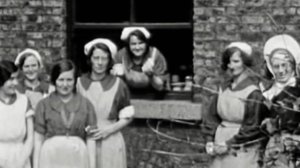It was years since I had heard the words Magdalene Laundry, but the report published yesterday brought them back to mind. They’d a bad name in Belfast, not because there were any there, but because they were used as an example of the reasons why Ulster would always say ‘no’. Many of my relatives had relatives and friends south of the border, and we had one cousin who was married to a women who had spent time in one of those benighted places in the 1940s. She’d fallen pregnant at the age of fifteen and he family had packed her off to be ‘cared for’ by the nuns. The stories she told made your blood boil – and to judge by the report, and the newspaper accounts now, she was telling the unvarnished truth.
I thought then, and still do, that it is some kind of sick joke to call the nuns who supervised such places ‘Sisters of Mercy’ or ‘Sisters of Charity’ – mind, the saying ‘cold as charity’ might be appropriate to such cases.
Aye, it was a different time and a different place, and folk back then were not afraid to take a strap to naughty children, and as a child I put up with, as many did, a style of what we then didn’t call ‘parenting’ that would have had Social Services coming in now. Not sure I’d have been any better off for that, given what we know about conditions in some of those homes, but I still think we’ve a right to expect better standards from Christians.
‘The Maggies’, as the girls were called, were quoted by Ulster Protestants as an example of what happened when the State and the Church were hand in hand – ‘Home Rule means Rome Rule’ was still remembered by my grandfather’s generation.
It is, to be sure, a puzzle that a faith whose founder said so much about love and care, should have spawned folk in whom the milk of human kindness curdled so swiftly. But to somehow say that the connection between the Irish State and the Magdalene laundries should stand as an indictment of Catholicism is to go further than the evidence warrants. Was the British State any better in the way it dealt with such adolescents? No. It was a harsh society in harsh times.
There are legitimate questions though to be asked about any form of Christianity (and they are by no means exclusively Catholic) which manages to subject the most vulnerable to treatment such as that catalogued in the Irish report. There are legitimate questions to be asked about abuse of power and position, questions which apply in other areas.
If there is an institution in our society which deals with children and young people which has not attracted sadists and sexual deviants, I can’t bring it to mind. My own profession, teaching, has had many, but so too have children’s homes, hospitals, social services and various voluntary organisations. We’re a fallen people, and without Christ we’d be worse. Why God loves us is a great, to me the greatest, mystery.


I was educated in England by the Benedictines, at about the same time as the “Maggies.” Schools not matter what their strip in those days operated on the principle as was quoted by one of my Latin teachers,”Ships and boys are governed by their sterns.” This kind of abuse was rampant. It was born of ignorance and gender blind. It was the same kind of ignorance parents of the day spouted, “Children are to be seen and not heard.” As a psychotherapist, I’ve encountered many an adult traumatized by such constant stupid remarks.
These were indeed dark days and not limited to the Magdalene Laundries. It was the last hangover from the idiot Victorian Era.
Just saw a movie, Philomena, which may have a connection to your topic. I’m not sure.
” Back in the ’50s, an Irish-Catholic girl got pregnant and was banished to the Sean Ross Abbey in Tipperary, Ireland, where nuns abused her and eventually sold off her son for £1,000. All these years later the now elderly woman still feels the pain of that loss, the ache of not knowing what happened to her boy.” http://www.pluggedin.com/movies/intheaters/philomena.aspx
A devastating story of what the Catholic Church did to young girls in recent history. A real eye opener. We think of this kind of abuse as ancient history, when in reality it continues today.
Yes, it does, and that is how it was back then – makes you shiver.